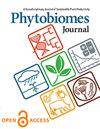Unravelling the bacterial community composition of Valerianella locusta, a cold tolerant plant
IF 3.3
3区 生物学
Q2 MICROBIOLOGY
引用次数: 0
Abstract
Low temperatures greatly affect plant growth. Besides the development of own protection mechanisms, plants may rely on microorganisms to help them cope with cold. As Valerianella locusta (lamb’s lettuce) is a cold-adapted plant, it represents an interesting plant to understand how cold affects the root bacteriome. By means of amplicon sequencing of 16S rRNA genes, we identified the taxa forming the main cold root bacteriome of lamb’s lettuce. The analysis of the root microbiome of a naturally growing V. locusta population and the study of the changes in the root microbiome of cultivated V. locusta grown under cold and ambient conditions allowed us to detect four cold-responsive families, of which Oxalobacteraceae presented the strongest shift under chilling temperatures. Moreover, the plant genotype had a small, but significant, effect on the response of the root bacteriome to cold. Finally, several bacterial candidates were discovered that may possibly alleviate the effect of low temperatures on plant fitness, namely Massilia ASV2, Flavobacterium ASV5 and ASV11, or Acidovorax ASV20. However, currently, only ten cold-enriched isolates could be obtained in cultivation, of which Flavobacterium R-83141, Polaromonas R-83176, R-83177, R-83175 and Acidovorax R-83129, were able to increase either the root, shoot and/or total fresh weight of a cold sensitive ecotype of A. thaliana (Cvi-0). Our results provide an overview of the taxa forming the root microbiome of this species and of the compositional shift that occurs under cold temperature treatment, demonstrating the impact of low temperatures on the composition of the root microbiome.揭示耐寒植物枇杷缬草的细菌群落组成
低温对植物生长有很大影响。除了自身保护机制的发展,植物还可能依赖微生物来帮助它们应对寒冷。由于Valerianella locosta(羔羊莴苣)是一种适应寒冷的植物,它代表了一种有趣的植物来了解寒冷如何影响根菌群。通过16S rRNA基因的扩增子测序,我们确定了形成羔羊莴苣主要冷根菌群的分类群。通过对自然生长的室曲霉种群的根系微生物组的分析,以及对在寒冷和环境条件下生长的栽培室曲霉根系微生物组变化的研究,我们能够检测到四个对寒冷有反应的家族,其中在低温下,牛杆菌科表现出最强的变化。此外,植物基因型对根菌群对寒冷的反应有很小但显著的影响。最后,发现了几种可能减轻低温对植物适应性影响的候选细菌,即Massilia ASV2、Flavobacterium ASV5和ASV11,或Acidovorax ASV20。然而,目前,在培养中只能获得10个富含冷的分离株,其中黄杆菌R-83141、极单胞菌R-83176、R-83177、R-83175和嗜酸菌R-83129能够增加冷敏感生态型拟南芥(Cvi-0)的根、茎和/或总鲜重。我们的研究结果概述了形成该物种根系微生物组的分类群,以及在低温处理下发生的成分变化,证明了低温对根系微生物组组成的影响。
本文章由计算机程序翻译,如有差异,请以英文原文为准。
求助全文
约1分钟内获得全文
求助全文

 求助内容:
求助内容: 应助结果提醒方式:
应助结果提醒方式:


